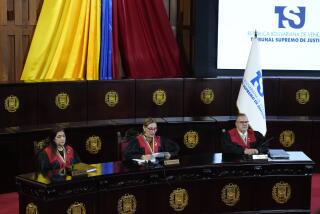President Far Ahead in Bangladesh Voting : Ershad Reported on Way to Landslide Victory in Referendum; Opposition Calls Vote a Farce
- Share via
DHAKA, Bangladesh — Early returns in a referendum on the martial-law rule of President Hussain Mohammed Ershad showed him on his way to a landslide victory Thursday, but opposition leaders called the balloting a farce and challenged the turnout figures reported by the government.
A victory for Ershad, who came to power in a bloodless coup three years ago, was considered a near certainty. Voters were merely asked to declare whether or not they “have confidence in the policies and programs” of Ershad and want his rule to continue until elections are held.
The Election Commission said results from 56% of the 22,984 polling centers showed 18.2 million “yes” votes supporting Ershad, and 1 million “no” votes opposing his rule, the Associated Press reported.
Ershad had said that he would consider a “yes” vote of more than 50% a vote of confidence.
The Election Commission did not announce a turnout figure, but state-run Radio Bangladesh said 65% of the 48 million eligible voters had cast ballots.
A government spokesman earlier described the vote as a success and estimated the turnout at more than 50%. The highest turnout in a general election in Bangladesh (formerly East Pakistan) came in 1971, when 56.7% of those registered voted.
Voting Day Holiday
Opposition leaders, seeking an end to martial law and a transition to democratic rule under a caretaker government, had urged a boycott of the referendum and a general strike. Ershad countered by declaring Thursday a holiday.
Rashid Khan Menon, spokesman for a 15-party opposition coalition, issued a statement Thursday calling the referendum a “farce.” He asserted that no more than 5% of eligible voters went to the polls nationwide, and that his alliance had known that “the autocratic rulers would announce the results using pre-planned statistics.”
Turnout appeared sparse as the government led several foreign reporters on a tour of polling stations in the old port city of Chittagong and the eastern border city of Comilla.
As a van carrying the foreign press approached a dockside polling station in Chittagong, government poll workers hurriedly herded bystanders into lines in front of voting booths. Some of those in the hastily formed lines were children, much too young to vote. Others said they had already voted earlier in the morning. When the reporters returned to their van and began to leave, the lines dissolved.
In Dhaka and at other Chittagong polling places not on the government tour, there were only short lines of voters. The turnout in rural areas, where Ershad is said to have his strongest base, also appeared sparse but a little larger than in the cities.
The Associated Press reported that at a Dhaka high school, 2,712 voters were registered but only 330 had voted by midday. Among the female voters registered at a nearby girls’ school, 6% had voted. However, in the industrial town of Tungi, 15 miles from Dhaka, 2,000 of 3,700 registered voters had been to the polls by midday.
Turnout Figure Challenged
Many observers outside of government challenged the government reports on turnout, citing widespread apathy over an election without contests and the opposition’s call for a boycott.
“I don’t think there was a spontaneous turnout of any substantial number,” said former Deputy Prime Minister Moudad Ahmed, a Dhaka attorney out of favor with the government who has been in hiding for the last 20 days. “I’m just laughing at the numbers. To say that a referendum with no campaign would have more votes than a general election with 25 parties is statistically unthinkable.”
More to Read
Sign up for Essential California
The most important California stories and recommendations in your inbox every morning.
You may occasionally receive promotional content from the Los Angeles Times.













